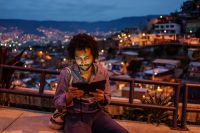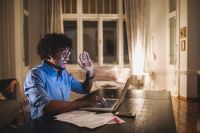This page is updated regularly to present ongoing work and insights. It was last updated June 23.
The COVID-19 pandemic continues to be an unprecedented crisis, even as infections and deaths begin to ebb in parts of the world. In the United States, virtually all aspects of people’s lives have changed through shelter-in-place and social distancing orders, massive layoffs, stock market uncertainty and the sudden need to balance work and family responsibilities in new ways – all while many thousands continue to fall ill and, in some cases, to die. Politicians and civil servants wrestling trying to balance the need to isolate with the need to socialize, have opened and then sometimes community gathering spots.
Stanford scholars have been involved in addressing the immediate – and continuing – medical challenges created by the pandemic. They have aggressively pivoted their research to aid in the effort to understand the virus and to create COVID-19 tests, vaccines, protocols and treatments.
Beyond addressing the scientific, technical and medical challenges of the pandemic, Stanford scholars have also been considering the wider societal, economic and legal implications in recognition that life as we know it is likely forever changed.
As is its legacy, Stanford is applying its interdisciplinary expertise in the hopes of ensuring an equitable recovery for all people and offering solutions that can be scaled to benefit the world.
Below is a sampling of the ongoing work and perspectives.
Stanford researchers lead effort to build rapid-response ventilators
An effort to design and build new, simplified ventilators for patients with severe cases of COVID-19 is being led by researchers at Stanford.
The 1930s Depression Was ‘Great.’ This One Might Be Greater
Economist Nicholas Bloom, who has spent years tracking “uncertainty shocks,” says this downturn be worse than what followed the financial crisis of 2008 and it could rival the Great Depression.
















































































Social context of COVID-19
The challenges posed by COVID-19 go beyond those related to health and medicine. As the pandemic subsides, a changed world will emerge that requires study and consideration. Nations worldwide will have to work to ensure that the recovery is equitable for all and that humanity is better prepared to act the next time a pandemic occurs.